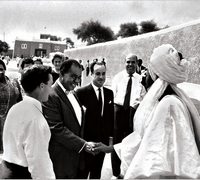Over time we have come to realize that culture is the obstacle, and that culture is the best way to change culture. -- Alyse Nelson, President, Vital Voices
The word "culture" conveys multiple meanings. Alyse Nelson, president of the non-governmental organization Vital Voices, which promotes women's empowerment globally, notes that "culture" in the anthropological sense is often evoked as a rationale for limiting women's roles in society, while "culture," meaning creative expression, can present a vision of an attractive alternative lifestyle or solution that can break the stranglehold of tradition. When Vital Voices works with local partners in different parts of the world to open up opportunities for women and girls, opposition to these changes in society often comes in the form of people saying, "That goes against our culture." Ms. Nelson, who has no arts background, has been surprised to discover that creative expression -- providing a platform for women to tell their own stories -- has the greatest potential to dismantle these cultural barriers.
"Seven," a powerful documentary play that tells the stories of seven courageous women leaders within the Vital Voices Global Partnership Network, has electrified audiences in New York, London, and elsewhere. Written by seven American female playwrights, in collaboration with seven woman leaders, "Seven" gives voice to extraordinary women -- such as Muktar Mai, who pressed legal charges against the men who gang-raped her in an act sanctioned by her Pakistani village government. Through "Seven," Vital Voices discovered the truism observed by Nigerian author Wole Soyinka: that culture has the capacity to humanize while politics tends to demonize. If Vital Voices has found an obstacle in "culture," in the anthropological sense of customs and behaviors, it has found a strong ally in "culture," as in creative expression.

